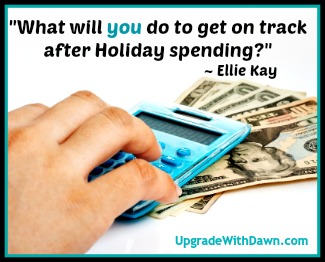Get Back on Track after Holiday Spending
In this special, much-needed Financial UPGRADE, Ellie Kay—"America’s Family Financial Expert" ®—will help us become better stewards of our resources, helping us get back on track in the New Year.
 "The worst decision you can make in regards to your finances," Ellie says, "is to have no plan for financial recovery."
"The worst decision you can make in regards to your finances," Ellie says, "is to have no plan for financial recovery."
Financial stewardship and use of resources is taught throughout the Bible, encouraging wisdom (Proverbs 21:20), proportionate, unselfish, cheerful giving (Deuteronomy 16:17; Luke 6:38; 2 Corinthians 9:7) and right priorities—putting God and His work first (Malachi 3:10).
Whether we've been careful in our spending or we've "blown it" financially over the holidays, I (Dawn) think Ellie has some wise principles to help us move forward into greater financial freedom.
She continues . . .
Sometimes, a decision that starts as a New Year’s Resolution can end in a dream come true when you let those resolutions become a new way of life.
Our family did this to get out of debt and pay cash for our cars. We wanted to be better stewards of the resources that God gave us and we decided to give our finances an upgrade by doing things wisely.
Here are some common resolutions that can get you back on track in the New Year, even as they did for our own family.
Resolution #1: Pay off Consumer Debt
An excessive amount of consumer debt usually means a lower credit score (FICO), which means higher annual percentage rates (APRs) on existing credit cards. By improving your FICO, you can lower the APRs, thus paying off that debt in a fraction of the time.
It’s not hard to improve your FICO by following three easy steps:
Step 1 - Pay on Time
Not only does a late payment mean high late fees, but part of your score is determined by payment history. Set up automatic payments online with each card to make sure you’re never late again.
Step 2 - Pay in Proportionally
Utilization, which is the ratio of debt to available credit is important. For example, if your card has a limit of $5,000 and you have $2,500 charged, your ratio is 50%. Adjust the balances on your cards to make sure each has no more than a 50% ratio.
Step 3 - Pay it Down!
Pay as little as $5 to $10 more than your minimum credit card payment. It shows up on paper as the consumer trying to “pay down” the debt.
You can also get out of holiday debt sooner if you reduce spending and repurpose those funds.
As soon as you save in one area, immediately channel the money you saved toward your debt load. If you don’t take that saved money and put it toward a credit card or other debt, then it will just get reabsorbed into your spending.
Resolution #2: Pay Cash for Your Cars
The least expensive car you can own is the paid-for car that you currently drive.
By going to my tool section at EllieKay.com and clicking onto the “Automobile Affordibility Calculator” you can see how much to save each month in order to afford to pay cash for a newer car. It is a lot easier than you think.
Once you’ve paid off your current car, don’t trade it in, but keep making payments to yourself in the amount of the former loan. So let’s say you put $350 per month into a car fund and invest it in a fund that makes 5% annually. You would have around $4400 at the end of the year, plus the value of your existing car (let’s estimate $5,000) to put almost $10,000 down on a newer car than you now own.
If you keep saving and keep trading up, then you’ll be able to pay cash for your cars for the rest of your life!
In the first fifteen years of our marriage, on one (military man’s) income, we bought 11 cars this way, paying cash and even donated some of those used cars to charity! When you do things God’s way, He often provides ways for you to be a blessing to others.
What will you do to get on track after Holiday spending?
 Ellie Kay is a regular expert on national television with ABC NEWS NOW’s Money Matters and Good Money shows. Ellie is also a national radio commentator, a
Ellie Kay is a regular expert on national television with ABC NEWS NOW’s Money Matters and Good Money shows. Ellie is also a national radio commentator, a frequent media guest on Fox News, and CNBC, a popular international speaker, and the best-selling author of fourteen books including her newest release, The Little Book of Big Savings (Waterbrook, 2009).
Graphic adapted, Image courtesy of Stuart Miles at FreeDigitalPhotos.net.
 Post a Comment → Posted on
Post a Comment → Posted on  Tuesday, January 6, 2015 at 8:01AM
Tuesday, January 6, 2015 at 8:01AM  Buying a Car,
Buying a Car,  Debt,
Debt,  Debt load,
Debt load,  Ellie Kay,
Ellie Kay,  Finances,
Finances,  Financial Recovery,
Financial Recovery,  Holiday Spending,
Holiday Spending,  Upgrade with Dawn Upgrade Your Life
Upgrade with Dawn Upgrade Your Life  Finances,
Finances,  Goals,
Goals,  Holidays
Holidays 





Reader Comments